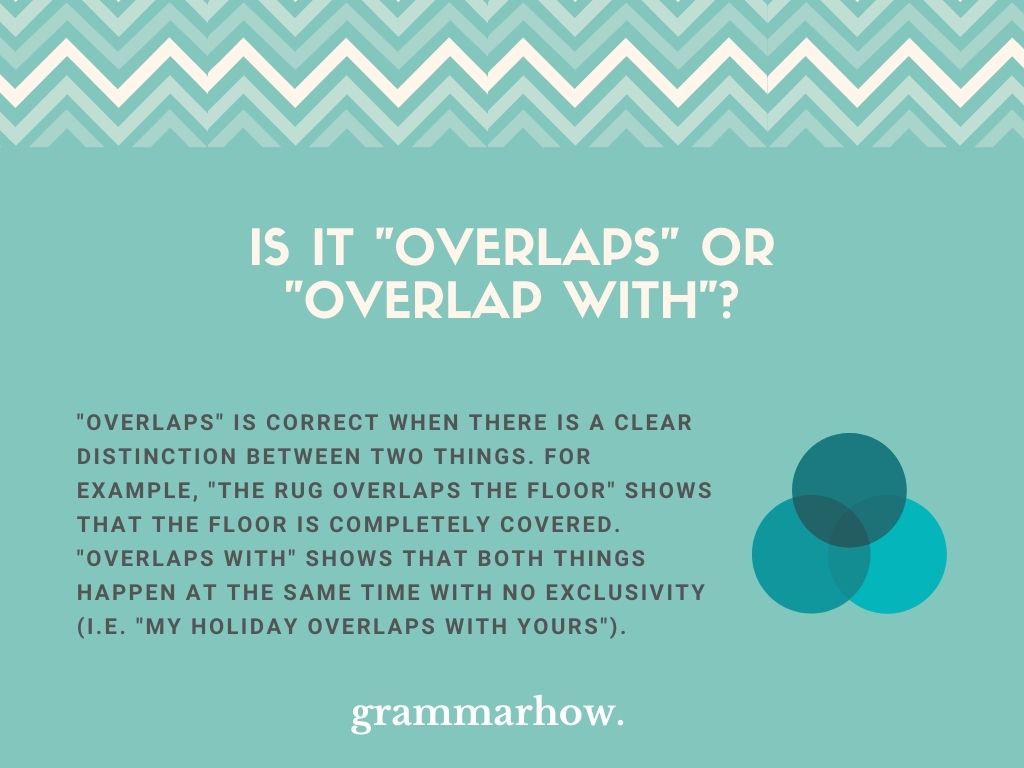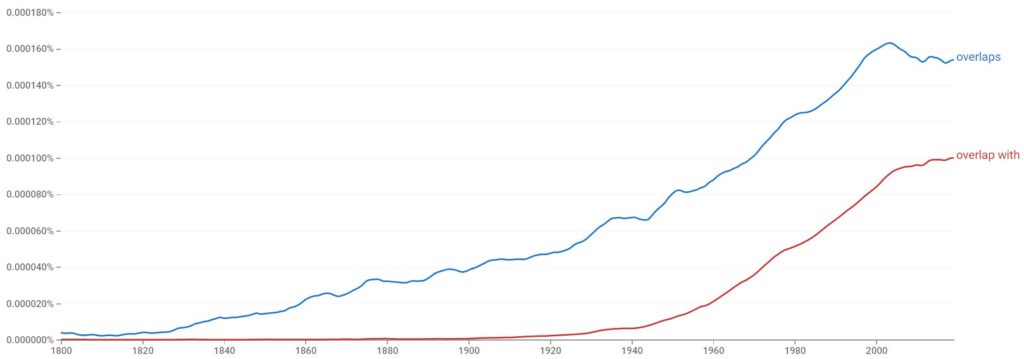When using “overlap” in your writing, it would help to know how to use it correctly. We are met with two options; “overlaps” and “overlaps with.” This article will present some ideas for you to see which one works best.
Is It “Overlaps” Or “Overlap With”?
“Overlaps” is correct when there is a clear distinction between two things. For example, “the rug overlaps the floor” shows that the floor is completely covered. “Overlaps with” shows that both things happen at the same time with no exclusivity (i.e. “my holiday overlaps with yours”).

“Overlaps” on its own implies that something is taken over by another thing. “Overlaps with” shows that two things can happen at the same time without one of those things being forgotten about or left behind.
It’s a nuance that many people overlook when it comes to learning English. It doesn’t seem like a simple preposition like “with” would have that much impact, but you’d be surprised by how much it can change a sentence.
When Should I Use “Overlaps”?
Let’s take a bit of a closer look at both forms. We’ll start with “overlaps” as it comes with a more definitive meaning.
“Overlaps” works when there is a clear distinction between the two things involved in the sentence. It shows that one thing will overlap another without the other thing being visible or clear anymore.
It is an exclusive term that shows that one thing can no longer exist while another thing “overlaps” it.
Check out some of these examples if you’re struggling to wrap your head around it:
- I think this cushion overlaps the design of the covers too much, so I don’t want it here.
- The rug overlaps too much of the floor, which is why it’s always so warm in this room.
- I’m sorry, but your holiday overlaps the days that you are not allowed to book off. They’re our busiest period.
- I could have sworn I saw this overlap the other item, but now I’m seeing them both in front of me.
- I would suggest buying something that overlaps the stain! Then you won’t have to worry about it.
- Can you find anything to overlap the issue? If we can just ignore it, things will return to normal.
- I don’t know why you didn’t think about overlapping it sooner! It’s an eyesore!
When Should I Use “Overlap With”?
Now let’s see how the inclusion of “with” changes the meaning.
“Overlap with” works best when two things can happen simultaneously. Even though both things are happening at the same time, neither thing works to remove the other.
This time, we are using “overlap with” in a less exclusive way. It shows that two or more things can happen together (even if they are not related to one another).
Here are a few examples that might help you with it:
- I thought that our vacations overlapped with each other, but I don’t think the boss minds too much now.
- These events overlap with each other, but I’m sure you’ll manage to find a way to attend both.
- Don’t worry; I’ve scheduled everything in such a way that nothing overlaps with anything else.
- I have a few things here that overlap with each other, and I’m not sure how I’m going to get around to them all.
- We have a holiday that overlaps with this event. Is there any way we can reschedule?
- I don’t mind if the meetings overlap with each other. It would save me a lot of trouble coming in on different days.
- If you can stop these from overlapping with each other, I would really appreciate it!
Is “Overlaps” Or “Overlap With” Used The Most?
It might help if you saw some statistics of the two phrases in use. Then, you’ll have a better understanding of which one tends to be more common.
According to Google Ngram Viewer, “overlaps” is the more common choice of the two. It’s more common because most people use “overlaps” as a way to show that something is a final decision.

If something “overlaps” another thing, the original thing likely has to be canceled. Generally, something more important will have come along, which is why we use “overlaps” more frequently.
With that said, “overlap with” is still popular on the graph. It just isn’t as popular as the independent “overlaps.”
Can “Overlap” Be Used With Other Prepositions?
There aren’t many other prepositions available to use after “overlap.” However, some people do use “at” when talking about times or places.
“Overlap at” can work when we are talking about two things taking over each other at a specific time or place.
For example, if you’re watching a race between two people, you might say one of the following:
- Michael overlaps Johnny at the six-meter mark.
Other than that, there aren’t many great alternative prepositions available to us. It’s because “overlaps” already works really well on its own, so it doesn’t benefit from the inclusion of an extra preposition.
What Does It Mean To “Overlap”?
Now let’s find out more about the meaning of “overlap.” Both with and without the preposition, the meaning is the same.
“Overlap” means that two things cover the same area or happen at the same time. It can refer to things or activities and depends entirely on the context. Usually, there isn’t room for both of these things to happen at the same time.
The definition of “overlap,” according to The Cambridge Dictionary, is “the amount by which two things or activities cover the same area.”
It’s also possible to use “overlap” when you’re talking about someone or something moving in front of another thing. For example, you could “overlap” the lines of a paint-by-numbers if you’re not being careful with your brushstroke!
“Overlap” – Synonyms
Finally, let’s check out some synonyms that we can use to replace “overlap.” You might find that one of these is more suitable to your writing:
- Conjoining
- Crisscrossing
- Intersecting
- Overtaking
- Lapping
- Overrunning
- Overhanging
- Riding
- Protruding
- Happening at the same time

Martin holds a Master’s degree in Finance and International Business. He has six years of experience in professional communication with clients, executives, and colleagues. Furthermore, he has teaching experience from Aarhus University. Martin has been featured as an expert in communication and teaching on Forbes and Shopify. Read more about Martin here.
